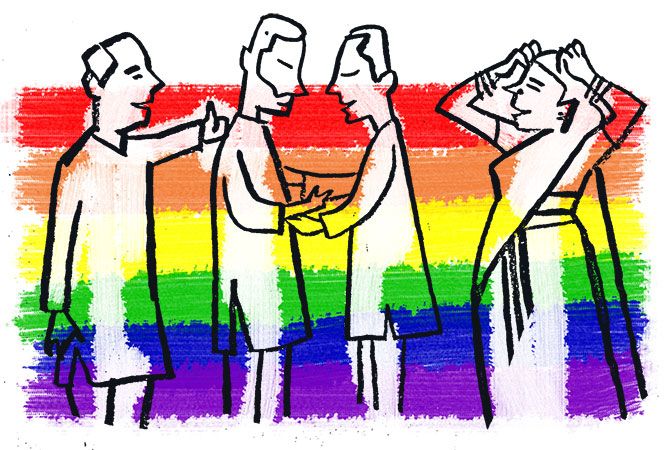 | « Back to article | Print this article |
In the past decade-and-a-half, sections of urban India have become much more liberal about accepting gay men and women than our colonial-era laws might have suggested, says Rahul Jacob.
Illustration: Dominic Xavier/Rediff.com

When a friend was 13, he recalls an uncle asking those at a family Sunday lunch to name the kind of person they could not stand.
"Rude people," said one relative.
"Apathetic people," volunteered another.
Then an uncle said, "Gay people."
Such casual cruelty can leave emotional scars that last decades.
Happily, my friend is a portrait of boisterous confidence and lives in Delhi with his boyfriend, whom he met in high school.
The uncle has come a long way, too: He is throwing a 'Goodbye 377' party to which all the family elders are invited.
I am not surprised. One of the most fun Diwali parties I have been to was at this friend's parents' home where both pairs of parents were seen dancing with their respective 'sons-in-law'.
In the past decade-and-a-half, away from the headlines and the din of the evening TV shows, sections of urban India have become much more liberal about accepting gay men and women than our colonial-era laws might have suggested.
In that sense, parts of our diverse society were already well ahead of our courts. This is because many more upper middle income gay and lesbians have come out to their families than a generation ago.
Acceptance is spreading, if incrementally, outside India's large metropolises.
The bonds of family in India are so strong that the reaction to the news that a son or daughter is gay, more often than not, is a fierce protectiveness rather than exclusion.
I was gifted extraordinarily liberal parents, but, having grown up in a different India, I delayed telling them I was gay by almost a decade after I came to terms with it.
It is the most singularly foolish mistake I have made in my life; the revelation was a non-event.
Even so, 12 years ago, my eldest brother and my eldest cousin worried that I did not discuss the gay side of my life often enough with the rest of the family.
I assured my brother, who lives with his family in northern California, that this was not true; my late parents not only knew I was homosexual, they had been on holidays with openly gay friends of mine and their boy friends.
I just happened to be single, which meant there was less to report.
As it happened, it was Gay Pride Week in the US a month or so later.
My eldest brother sent an e-mail to all of us saying that the rainbow flag -- the lesbian, gay and transgender multi-hued banner -- was flying outside Oracle's headquarters all week.
Back came my father's characteristically sarcastic reply: 'Meanwhile, in this benighted country, we are busy signing petitions (a reference to the campaign in 2006 supported by Vikram Seth, Amartya Sen and others) seeking to decriminalise all forms of sex other than the missionary position!'
I mischievously forwarded this to my brother saying I hoped he was satisfied; we were now reduced to discussing the nitty-gritty of sex with my father.
A couple of years later, when Mint published a favourable review of my book, Right Of Passage, and quoted part of an essay on New York where I had written about being gay, my father promptly forwarded it to everyone on his e-mail list.
I recently looked up the meaning of the word benighted. It means 'in a state of pitiful or contemptible intellectual or moral ignorance'.
I often aspire to the precision with which my parents deployed words and this one perfectly captures the darkness that adhering to an outdated Victorian prudishness had cast over India.
It relegated us to membership of a club that includes Iran, Saudi Arabia, Nigeria and Uganda till the Supreme Court's sensitively argued judgment set things right last month.
The judgment's humanity and empathy has been applauded the world over.
Scrolling through The Jakarta Post Web site a couple of weeks ago, I found that the second most read story of the leading English-language paper in Indonesia was about whether Singapore's courts would be pressured to follow in India's footsteps.
India's corporations must play catch-up in creating environments at work that are free from prejudice.
Emboldened by the 377 judgment, an employee of Tech Mahindra accused a manager of homophobia and saying hateful things about Muslims as well.
In a human resources morality play that played out on Twitter, within a few days of the complaint against this executive (ironically in charge of diversity), Tech Mahindra had taken action and publicly responded to the employee: '@gauravpramanik, arising out of an investigation carried out in the matter, the concerned employee has been separated from the employment of the company with immediate effect.'
This is huge progress, and underlines the importance of diversity.
As our learned judges put it more elegantly, 'We must realise that different hues and colours together make the painting of humanity beautiful.'